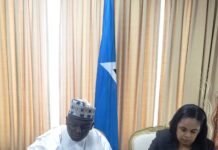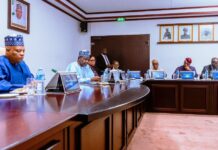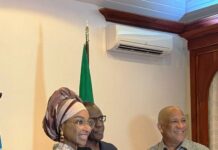REMARKS BY THE HON. MINISTER OF INFORMATION AND NATIONAL ORIENTATION, ALHAJI MOHAMMED IDRIS, AT THE WORLD PRESS CONFERENCE HELD FOR THE BLUEPRINT ON THE NATIONAL VALUES CHARTER (NVC), AT THE PRESS CENTRE, RADIO HOUSE, ABUJA ON TUESDAY 23RD JANUARY 2024
Protocol.
- It gives me immense joy to receive the blueprint of Nigeria’s new National Values Charter. This event marks another milestone in our evolution as a nation, bringing our various sub-national values together to create a national culture that speaks to our common destiny.
- Since the birth of Nigeria through amalgamation by the colonial British Government in 1914, the different peoples that make up the country have been grappling with the question of identity within the post-amalgamation structure of the country. This search for identity has been challenged, over the decades, by real and imagined ethnic, linguistic and cultural differences.
- While there is nothing wrong in recognizing these differences, we must not allow them to rob us of a strong sense of appreciation of our collective destiny. Our differences and diversity should be seen as strengths rather than weaknesses.
- The lack of understanding and acceptance of this reality is at the root of many of the problems undermining this great nation’s growth and development. It has led to needless ethnic suspicions and tensions, hate speech, when we should instead be seeing these differences and diversities as sources of strength to build one of the greatest nations on earth.
- The absence of values, and of a consensus around what our celebrated national values should be, has led to the elevation of immorality into a national lifestyle.
- We are therefore left with many serious questions, that need answering: How can we correct these abnormalities and chart a path that will lead us to the great heights that we truly belong to. How do we forge national cohesion and unity from our differences? How do we build the reputational capital of our country, at home and abroad? How do we ensure that the right behaviours and attitudes are the ones that are celebrated? How do we give the younger generation the hope and conviction that the future will be better than yesterday and today? How do we ensure that the ‘labour of our heroes past shall never be in vain’?
- Successive governments have grappled with finding compelling answers to these questions, as we have seen in such slogans as “Nigeria: Good People, Great Nation”, “Change Begins with Me”, the publication in 2020 of a National Ethics and Integrity Policy, among others. All of these efforts were geared towards building a nation with positive values that will enable us to be counted among the best in the world.
- What we are doing now is building on what has come before. Most importantly, we are serious about learning from the shortcomings of the approaches of the past, and ensuring that we do stands the test of time and outlives us.
- We are determined to define and document the core values that will guide all of us as Nigerians, irrespective of tribe, religion, social and economic status and all other real or imagined barriers and differences.
- We are also very much aware of the dynamism of the human experience, the fact that, especially in a technology-driven and borderless world, cultures and attitudes will evolve with time. And yet, even with these inevitable changes, the most important human values remain timeless and enduring.
- Let me say, at this juncture, that I am not unaware that many Nigerians have become skeptical and disenchanted with things in the country: security challenges, unemployment, corruption, failed promises, lack of social amenities, illiteracy, and many others.
- These have led many of our youths, our greatest assets as a nation, to emigrate in search of greener pastures. While migration is a natural human activity, many who leave would have wished to stay in a country blessed with human and natural resources if the situation were different.
- We acknowledge this grave dilemma that continues to confront many of our people. We will never be tempted to minimize the pains and challenges and frustrations that Nigerians face. At the same time, we will also always seek to emphasize that making our way out, and advancing along the path of lasting greatness, is a collective responsibility.
- By saying this, let it be clear that we are not trying to deflect any blame or responsibility due to Government or the ruling class. No. We are only seeking to map out, with this National Values Charter, the various rights, roles and responsibilities of all Nigerians—leaders and followers, public and private sectors—on this quest for national greatness. Everyone has a part to play; and I must say that the Government, made up of elected and appointed officials, will always have a very important burden of leadership responsibility upon it.
- The premise of the National Values Charter is that the government, as represented by elected and appointed representatives, must fulfil basic non-negotiable promises—in return for fundamental commitments from the citizens.
- After all, governance is a social contract; life is about give and take. As the famous saying goes, ‘to whom much is given, much is expected’. Every right comes with a burden of responsibility or set of responsibilities, just as every responsibility should guarantee the enjoyment of certain immutable rights.
- As such, the Charter contains Seven (7) Core Promises of the Nigerian state to the citizens, followed by the Seven (7) commitments of the citizens towards their country. This is a significant difference between past efforts and the present.
- Another vital improvement on earlier efforts is that the implementation strategy is comprehensive, as it considers the various ways the values can become engrained in the hearts and minds of every citizen.
- The National Values Charter also takes into full account the fact that we are a youth-centric and technology-driven world. On account of these, we are determined to ensure that the young people of Nigeria own this social contract, and are allowed to take the lead in using it to build, in concert with older generations, a better country, and a better world.
- I have the assurance of the National Orientation Agency (NOA), that various innovative approaches and socialization strategies will be employed to ensure that the Charter becomes part and parcel of our personal and collective existence as Nigerians.
- Let me also say that we shall shortly be announcing a date on which the President will formally unveil the Charter to the public.
- I thank the Director-General of the National Orientation Agency (NOA)—the Agency of the Federal Ministry of Information and National Orientation that has spearheaded the work on this very important project—his staff, and the members of the various committees that have worked very hard on this crucial National Values Charter.
- It is my sincere hope that all Nigerians, at all levels, will embrace it as a springboard, in line with the Renewed Hope agenda of Mr. President, His Excellency, Asiwaju Bola Ahmed Tinubu GCFR, to build a united, peaceful and prosperous Nigeria, that will take her rightful place in the comity of nations.
- I thank you all for listening.
Mohammed Idris
Minister of Information and National Orientation
January 23, 2024





